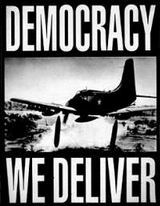
by NICHOLAS D. KRISTOF
With our Iraq policy floundering, it’s time to take advice from the experts — the Iraqis themselves.
And Iraqis are crystal clear about what the U.S. should do: announce a timetable for withdrawal of our troops within one year. They’re right. Our failure to declare a timetable and, above all, our coveting long-term military bases in Iraq feed the insurgency and end up killing more young Americans.
A terrifying new poll conducted last month found that 61 percent of Iraqis now approve of attacks on Americans. That figure, up from 47 percent in January, makes counter-insurgency efforts almost impossible, because ordinary people now cheer, shelter and protect those who lay down bombs to kill Americans. The big change is that while Iraqi Sunnis were always in favor of blowing up Americans, members of the Shiite majority are now 50 percent more likely to support violent attacks against Americans than they were in January.
The poll, by the Program on International Policy Attitudes at the University of Maryland, also found that 78 percent of Iraqis now believe that the American military presence is “provoking more conflict than it is preventing.” So ordinary Iraqis themselves — who have the most at stake — overwhelmingly think they will be better off if U.S. forces leave according to a timetable. Only 9 percent prefer President Bush’s policy of toughing it out, while 71 percent favor a withdrawal within one year.
This midterm election season is an ideal time for a public debate on Iraq policy, and Senator John Warner, the longtime Republican leader on military issues, is right to raise the possibility of a “change of course.” The evidence suggests ever more clearly what we should do: Don’t rush for the exits, but renounce permanent bases and announce that we will withdraw our troops within one year.
Renouncing bases should be a no-brainer, and it would be the simplest way to save American lives. Seventy-seven percent of Iraqis say the U.S. plans permanent bases in Iraq. (They’re right, although we hem and haw about it.) And as the poll discovered, “the belief that the United States plans to have permanent bases in Iraq is highly correlated with support for attacks on U.S.-led forces.”
Iraqis who don’t think the U.S. wants bases are half as likely to favor attacks on Americans as those who do think the U.S. wants bases. And so if President Bush stands up and unequivocally renounces bases, that will reduce popular support for attacks — and save American lives.
“There is also some evidence that if the United States were to make a commitment to withdraw according to a timetable, support for attacks would diminish,” the survey found. For example, half of those who approved of attacks said they would be less supportive if the U.S. did announce a timetable for withdrawal.
The biggest mistake we Americans have made all over the world in the post-World War II era, from China and Vietnam to Latin America and Iraq, has been the failure to appreciate the appeal of nationalism. Ironically, it’s the same big mistake King George III made in the 1770’s.
All our options are bad, and I worry that a timetable will encourage the insurgents to hang on until we leave. Or maybe Iraq will fall apart no matter what we do. But the evidence is pretty strong that our presence — because of suspicions that we plan to stay forever — is doing more harm than good. One poll conducted by our own State Department found that nearly three-quarters of Baghdad residents said they would feel safer if U.S. forces left Iraq, according to The Washington Post.
The present policy is also nurturing a broader extremism. A letter seized by the U.S. military and reported by The Christian Science Monitor suggests that Al Qaeda itself is rooting for the U.S. to “stay the course” rather than withdraw. “Prolonging the war is in our interest,” the Qaeda letter says, presumably as a tool for propaganda and recruitment.
A U.N. report found that the Iraqi insurgency is inspiring the Taliban fighters in Afghanistan. New designs for bombs are used in Afghanistan just a month after they make their appearance in Iraq. Likewise, Sudan’s president is able to defy calls for international peacekeepers in Darfur because he plays on Arab fears that the U.S. plans to do to Sudan what it has done to Iraq. All over the globe, American diplomacy is hobbled because of Iraq.
So it’s time to face the grim reality and announce that all our troops will leave Iraq by October 2007.
Nicholas Kristof Bush Cheney Rumsfeld Politics Republicans News Iraq War